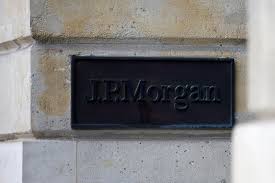The influential U.S. investment bank, JPMorgan Chase, has said it sees a growing chance that Afreximbank could be pulled into debt restructuring processes, especially in countries like Ghana and Zambia, where the bank has extended substantial credit. The development comes on the back of rising concerns over the bank’s financial health and a recent credit downgrade by global rating agency Fitch.
Despite these risks, JPMorgan is telling investors to take another look at the bank’s bonds. In a fresh market note issued on Tuesday, the bank upgraded its outlook on Afreximbank’s 2029 and 2031 bonds to “overweight”, saying they now offer good value following recent price corrections.
Earlier in June, Fitch Ratings downgraded Afreximbank, cutting its credit rating to one notch above junk status. It also gave the bank a negative outlook, meaning further downgrades could come. Fitch cited the bank’s high credit exposure, weak risk management, and a non-performing loan (NPL) ratio of 7.1% at the end of 2024 as key concerns.
The credit rating agency said it was particularly worried about the bank’s lending to sovereigns already in default or distress—notably Ghana, Zambia, and Malawi. These countries are all struggling with large debts and are either in restructuring processes or facing external payment difficulties.
Afreximbank, based in Cairo, insists it is a multilateral lender, not a bilateral creditor, and therefore enjoys preferred creditor status (PCS)—a designation which traditionally shields it from being involved in debt restructurings. But Fitch and other market observers note that pressure is mounting for more transparency and fairness in the treatment of all lenders.
In the words of JPMorgan’s analyst, Konstantin Rozantsev, the “likelihood of Afreximbank being drawn into restructuring discussions has increased.” If this happens, Fitch could downgrade the bank further from investment grade (IG) to high yield (HY), which could trigger forced selling of the bank’s bonds by investors restricted to holding only IG assets.
Still, JPMorgan believes the current bond prices already reflect these risks. According to the bank, both the 2029 and 2031 bonds are trading 75 basis points wider than similar bonds in the BB to BBB range, making them attractive to value-seeking investors who can stomach the potential volatility.
“Afreximbank bonds look cheap right now, and investors are well-compensated for the risk,” Rozantsev said.
Afreximbank has played a critical role in Africa’s economic recovery, especially during the COVID-19 pandemic, by providing emergency loans and facilitating commodity-backed financing. But this heavy involvement has increased its exposure to high-risk governments, raising concerns about the quality of its loan book and the bank’s future role in Africa’s sovereign debt space.
The bank has been at the centre of a controversy over whether its loans to Ghana and Zambia should be included in those countries’ ongoing restructuring talks. The debate is part of broader discussions under the Common Framework for Debt Treatments, a G20-backed initiative involving the IMF and World Bank, aimed at ensuring equitable debt resolution processes for struggling countries.
JPMorgan’s report reflects a shift in market sentiment, suggesting that investors are beginning to accept that Afreximbank might have to take some losses or make concessions if it is seen as part of the problem rather than the solution.
In response to the downgrade, yields on the bank’s dollar bonds widened, indicating investor concern. However, for those with a higher risk appetite, this might be an entry point.
Experts say that if Afreximbank loses its investment-grade rating, it could force large institutional investors—such as pension funds and insurance firms—to offload the bank’s bonds, causing further price drops and increased volatility across African markets.
All eyes are now on Afreximbank’s next move, as well as how the bank will navigate the political and financial pressure to participate in restructuring efforts. Analysts believe any official statement from the bank—or updates from Ghana and Zambia’s debt negotiations—could be market-moving in the coming weeks.
